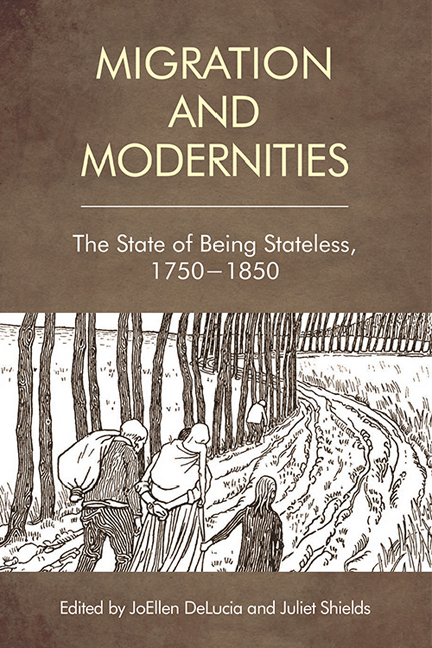8 - The Turkish Refugee as Vagrant Slave: Spaces of Disconnection and Dispossession in Ishmael Bashaw’s Refugee Narrative
Published online by Cambridge University Press: 05 May 2021
Summary
Today, when we think of populations placed in a “state of statelessness,” the image that comes nearly instantaneously to mind is that of the refugee – an individual defined by the UNHCR as “someone who has been forced to flee his or her country because of persecution, war, or violence.” It certainly is important to note that the category is an historical construction and that critics would be ill-advised to dehistoricize and essentialize the term by applying its contemporary meaning retroactively – and in particular to the period that interests me here, namely the eighteenth century.
The term “refugee” is not a twentieth-century invention. The Oxford English Dictionary records one of its first appearances in Christopher Wase's 1671 translation of Benjaminus Priolus's The History of France under the Ministry of Cardinal Mazarine. The earliest definition of the term in English solely referred to “[a] Protestant who fled France to seek refuge elsewhere from religious persecution in the 17th and 18th centuries.” For instance, John Evelyn mentions in his diary “[t]he poore & religious Refugieès who escaped out of France in the cruel persecution,” and The Tatler demands that “all the French Refugies in those Dominions … be naturalized.” In the novel Roxana (1724) by Daniel Defoe, the narrator, a native of France who fled to England, pretentiously observes: “I retain’d nothing of France, but the Language: My Father and Mother being People of better Fashion, than ordinarily the People call’d Refugees at that Time were.” Forced conversions to Catholicism began in France in the early 1680s, and – with the Revocation of the Edict of Nantes in 1685 – Protestantism was outlawed in the kingdom, which forced tens of thousands of French Huguenots to flee their country for the Netherlands, America, and England, especially London, where they contributed to the expansion of Calvinism, to the development of commerce, particularly in the silk industry, and to intellectual life. This definition of the refugee as a (French) person fleeing his or her country because of religious and political persecution was reinvented toward the end of the eighteenth century during the French Revolution.
- Type
- Chapter
- Information
- Migration and ModernitiesThe State of Being Stateless, 1750–1850, pp. 184 - 211Publisher: Edinburgh University PressPrint publication year: 2018

